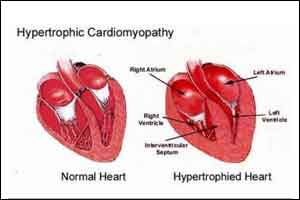- Home
- Editorial
- News
- Practice Guidelines
- Anesthesiology Guidelines
- Cancer Guidelines
- Cardiac Sciences Guidelines
- Critical Care Guidelines
- Dentistry Guidelines
- Dermatology Guidelines
- Diabetes and Endo Guidelines
- Diagnostics Guidelines
- ENT Guidelines
- Featured Practice Guidelines
- Gastroenterology Guidelines
- Geriatrics Guidelines
- Medicine Guidelines
- Nephrology Guidelines
- Neurosciences Guidelines
- Obs and Gynae Guidelines
- Ophthalmology Guidelines
- Orthopaedics Guidelines
- Paediatrics Guidelines
- Psychiatry Guidelines
- Pulmonology Guidelines
- Radiology Guidelines
- Surgery Guidelines
- Urology Guidelines
Rare case of Cardiomyopathy due to Gabapentin use

Dr Katie B. Tellor at St. Louis College of Pharmacy, St. Louis, Missouri and colleagues have reported a rare case of non-ischemic Cardiomyopathy following initiation of gabapentin therapy for pain management. The case has appeared in the Journal of Clinical Pharmacy and Therapeutics.
Gabapentin, a γ‐aminobutyric acid derivative, is used for the treatment of partial onset seizures, postherpetic neuralgia, diabetic neuropathy and a host of other neurological disorders.
According to history, a 44-year-old African American female, with no prior cardiac history, presented to the emergency department (ED) complaining of shortness of breath and cough. Two months prior to her presentation, the patient reported seeking care due to unresolved leg pain following a fall. She was prescribed gabapentin after an MRI revealed stenosis secondary to a broad-based disc bulge. Within 3 weeks of gabapentin initiation, the patient reported experiencing increasing shortness of breath as well as fatigue.
In the ED, the patient’s NT-proBNP was 2025pg/mL and an EKG revealed sinus tachycardia with non‐specific inferior t‐wave changes. Laboratory findings were unremarkable with the exception of a haemoglobin level of 11.2g/dL. A chest X-ray revealed cardiomegaly, and transesophageal echocardiogram (TEE) showed moderate concentric left ventricular hypertrophy with moderate left ventricular systolic dysfunction (ejection fraction [EF]: 36%), morphologic characteristics associated with noncompaction, mild right ventricular dysfunction with normal right ventricular size, biatrial enlargement, and moderate mitral and tricuspid disease.
After 3 days of hospitalization, she was subjected to coronary angiography which turned out to be normal . She had mild to moderate pulmonary hypertension (pulmonary artery pressure 32mmHg), elevated left ventricular end‐diastolic pressure (22mmHg), severe diffuse left ventricular dysfunction compatible with cardiomyopathy and severe mitral regurgitation.
The patient was initiated on carvedilol 12.5mg twice daily, spironolactone 25mg daily, and losartan 50mg daily. She was discharged on a life vest and an automatic cardioverter/defibrillator was placed after she experienced multiple episodes of nonsustained monomorphic ventricular tachycardia. Gabapentin was discontinued 2 months after the patient was diagnosed with non-ischemic cardiomyopathy. Within 3 weeks of stopping the drug, she started to feel better.
The patient was diagnosed with new‐onset non‐ischaemic cardiomyopathy with an ejection fraction of 36% measured on a transthoracic echocardiogram. Within two years, however, her ejection fraction improved.
This was a rare case of cardiomyopathy probably induced by gabapentin use (Naranjo score of 6). While the mechanism by which gabapentinoids may affect the heart is unclear, the authors concluded that “At this time, we recommend that gabapentin and pregabalin be prescribed with caution in the setting of heart failure.”
For more details click on the link: https://doi.org/10.1111/jcpt.12840

Disclaimer: This site is primarily intended for healthcare professionals. Any content/information on this website does not replace the advice of medical and/or health professionals and should not be construed as medical/diagnostic advice/endorsement or prescription. Use of this site is subject to our terms of use, privacy policy, advertisement policy. © 2020 Minerva Medical Treatment Pvt Ltd